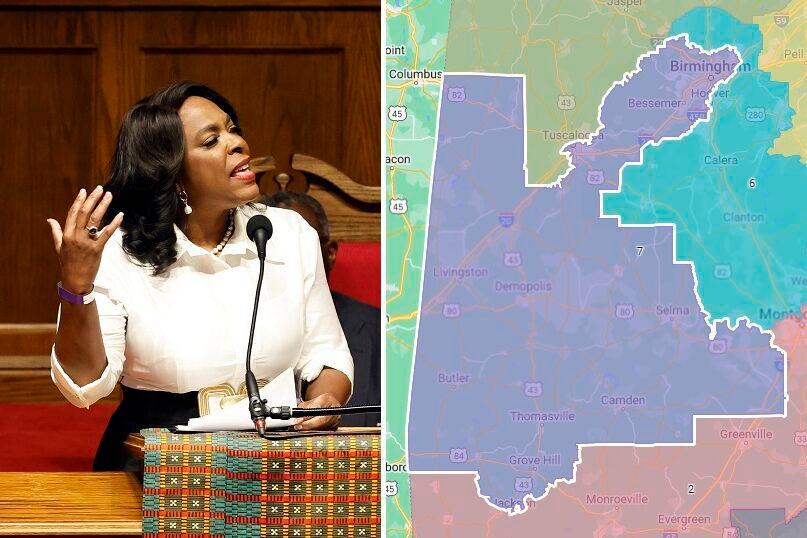It has been more than a week since a federal court three-judge panel chose a part-Frankensteinian, part-jigsaw puzzle new congressional district map as a response to a federal lawsuit alleging the Alabama Legislature racially gerrymandered its 2021 map to suppress the African-American vote.
This new map, which will be in effect for the 2024 election cycle, is a drastic change from the map that has roughly served the state for the past three decades.
This most prominent change is the map splits Mobile County, placing the bulk of the City of Mobile in a newly formed second congressional district as Phenix City in East Alabama, nearly 250 miles away.
Another oddity is the new map potentially pits incumbent U.S. Reps. Jerry Carl (R-Mobile) and Barry Moore (R-Enterprise) against one another in a 2024 congressional primary in a first congressional district that stretches from Dauphin Island to Dothan. The bulk of the direct route between those two endpoints includes a two-and-a-half-hour trip through Florida's first and second congressional districts in the state's Panhandle.
So much for compactness or preserving districts with so-called communities of interest.
While much of that will be debated in the coming months and years as various iterations of districting challenges make their way through the federal courts, Alabama's new maps have created some interesting political quandaries.
Who will be the GOP's nominee in the first congressional district? Can Jerry Carl win in the Wiregrass? Will he face Barry Moore, or will Moore opt to run for another office?
Who will emerge as the party nominees for the new second congressional district? Could Montgomery Mayor Steven Reed carry his hometown and the Democrat vote in Mobile County? Why are candidates who do not reside in the new district, including State Rep. Juandalynn Givan (D-Birmingham), State Sen. Merika Coleman (D-Birmingham) and House Minority Leader Anthony Daniels (D-Huntsville/Midway), flirting with a congressional run? Can a Republican still win in the second congressional district?
How will U.S. Rep. Gary Palmer (R-Hoover), who is running for reelection despite a 2014 term limit pledge, be received by his new constituents in the Montgomery suburbs in Autauga and Elmore Counties?
However, one congressional district will likely be spared from any election season drama: U.S. Rep. Terri Sewell's (D-Birmingham) seventh congressional district.
Sewell first ran for Congress in 2010 after then-U.S. Rep. Artur Davis (D) opted to run in that year's gubernatorial election.
In the July 2010 AL-7 Democrat runoff, Sewell defeated then-Jefferson County Commissioner Shelia Smoot by nearly 6,000 votes, which at the time was good enough for a 10-point margin. Sewell, then a Birmingham attorney, bested Smoot by almost 2,000 votes in Jefferson County, but she was strong in Dallas County, the site of her hometown, Selma. Dallas County proved pivotal for Sewell, which had a 3,841-799 vote victory over Smoot. Sewell also topped Smoot in the Black Belt's Perry County by a nearly 2-to-1 margin.
Under the new court-imposed map, the seventh congressional district includes Sewell-strongholds Dallas and Perry Counties. This gives her a distinct advantage over any candidate, especially from Birmingham, attempting to run against Sewell in the 2024 Democrat primary.
To achieve this geographic feat, Special Master Richard Allen's cartographer split up the historically aligned cities of Selma and Montgomery to form the district. The boundaries also divide three counties — Jefferson, Tuscaloosa and Clarke.
"I think that demonstrates clearly the intent of the court," former State Sen. Jim McClendon (R-Springville), who previously served as the chairman of the Alabama Legislature's Joint Reapportionment Committee, said during an interview with Mobile radio's FM Talk 106.5. "There's two important things here that really stand out. Number one, they obviously went out of their way to protect the incumbent and her congressional district seven, Terri Sewell. But the second and probably most important thing they did is they pitted two incumbent Republicans. Well, if you want to participate in the election process, then you eliminate one of the incumbents, and that is exactly what they've done."
This aspect had not gone unnoticed by Attorney General Steve Marshall, who has played a central role in a plaintiff's lawsuit that has evolved into a battle with the lower federal court.
Marshall noted how the newly drawn seventh district contradicted the stated aims of the three-judge panel during an interview with FM Talk 106.5.
"From what I understand in public comments from Representative Sewell — she said it didn't go far enough," Marshall said. "That somehow or another, the percentage should have been even higher. I think when we talk about what districts should look like, and this idea of communities of interest, obviously gets tossed around a lot. We don't think about it. But it is that connection, that fabric, that keeps communities together. What is one of the more famous things about the Black Belt and the Civil Rights Movement is that march from Selma to Montgomery. It is something that is celebrated every year with members of Congress coming down. We had that in the same district before, and we don't have it now."
"I think you've highlighted what is clearly a question: why?" he continued. "Because there is no legal reason to necessarily do it. It doesn't necessarily comport with any of the traditional redistricting principles. And, in fact, the one that the Supreme Court rejected, which is core retention, or in essence, or the historic nature of the districts for incumbents, the Supreme Court rejected for us, and yet the three-judge panel has kind of preserved that for Terri Sewell's benefit."
Jeff Poor is the editor in chief of 1819 News and host of "The Jeff Poor Show," heard Monday-Friday, 9 a.m.-noon on Mobile's FM Talk 106.5. To connect or comment, email jeff.poor@1819News.com or follow him on Twitter @jeff_poor.
Don't miss out! Subscribe to our newsletter and get our top stories every weekday morning.










